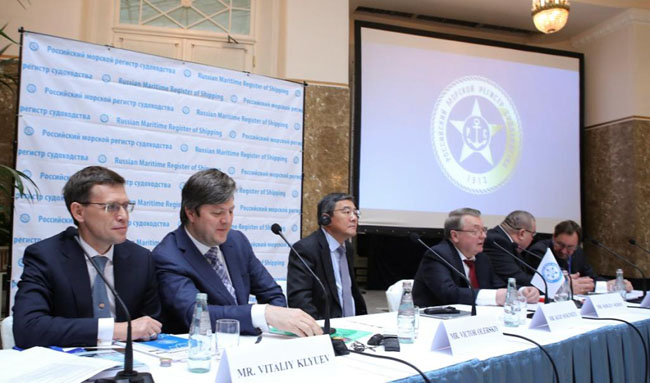RS hosts conference on Safety and Environmental challenges in the Arctic
The Russian Register of Shipping (RS) has recently hosted an international conference on the safety and environmental challenges in the Arctic
The need for year-round efficient and safe shipping in hard-to-reach Arctic areas gave a great impulse to the development of knowledge and technologies aimed at ensuring a high safety level of the transport solutions in this region.
The recent voyage of the IMO Secretary-General along the Northern Sea Route (NSR) opened a new chapter in the maritime history. Today, the international maritime community is focusing on the NSR as a measure to reduce the costs as well as time of cargo transportation, the latter resulting in reduction of the CO2 emissions. At the same time the safety of a ship in the harsh ice conditions and protection of the fragile Arctic ecosystems remain the major challenges the industry is facing.
During the conference the experts discussed possible solutions from technical as well as regulatory standpoints. The yards shared their experience in the innovative approach to ice class ships’ design while the representatives of maritime administrations touched upon various issues concerning the Polar Code.
Also widely debated was the ice retreat theory bringing to light different approaches to ice retreat forecast, which all in all confirms the number of the high ice class ships and icebreakers required is continuously increasing.

It is remarkable that all the participants unanimously agreed on the need for the development of the Polar Code. According to the IMO Secretary-General, the Polar Code may be implemented by IMO in 2017. He emphasised that IMO needs good scientific and technical base to complete the code and therefore, expressed his gratitude to RS for dedicating the conference to technical discussions of Arctic shipping development among the leading experts in design, construction and operation of sea transport.
The leading yards presented state-of-the-art solutions in icebreaking ships’ hull design and propulsion. Their presentations covered oblique icebreaker’s design, a pioneer LNG-fuelled icebreaker for Finland, possibilities for double acting feature of the future Yamal LNG Arctic gas carriers and other innovations. The shipping companies operating in the Arctic shared practical experience of transit navigation along the NSR.
Among the participants to the conference were Secretary-General of the International Maritime Organisation (IMO) Mr Koji Sekimizu, Deputy Minister of Transport of the Russian Federation Mr Victor Olerskiy, Executive Director of the European Maritime Safety Agency (EMSA) Mr Markku Mylly, senior officials from international associations (ICS, BIMCO), Maritime Administrations (China, Denmark, Germany, Norway), Russian oil majors (Gazprom, Rosneft), ship owners (Sovkomflot, Maersk), design bureaus, scientific research institutes, shipbuilding yards, insurance companies, as well as other representatives of the shipping industry.





























































